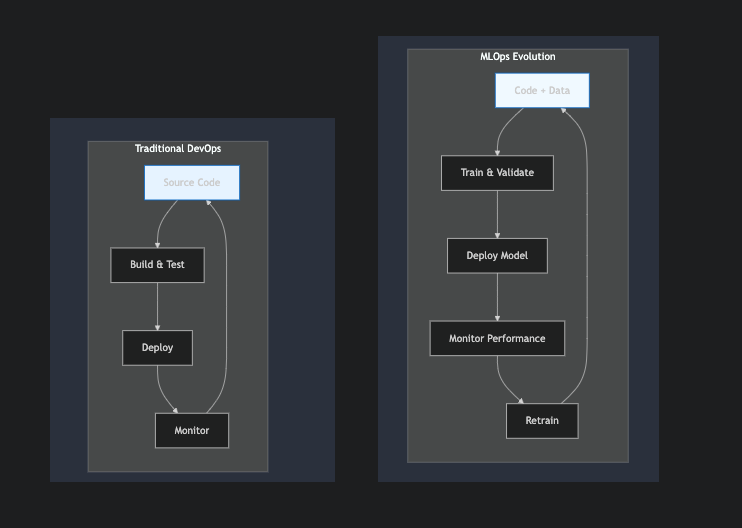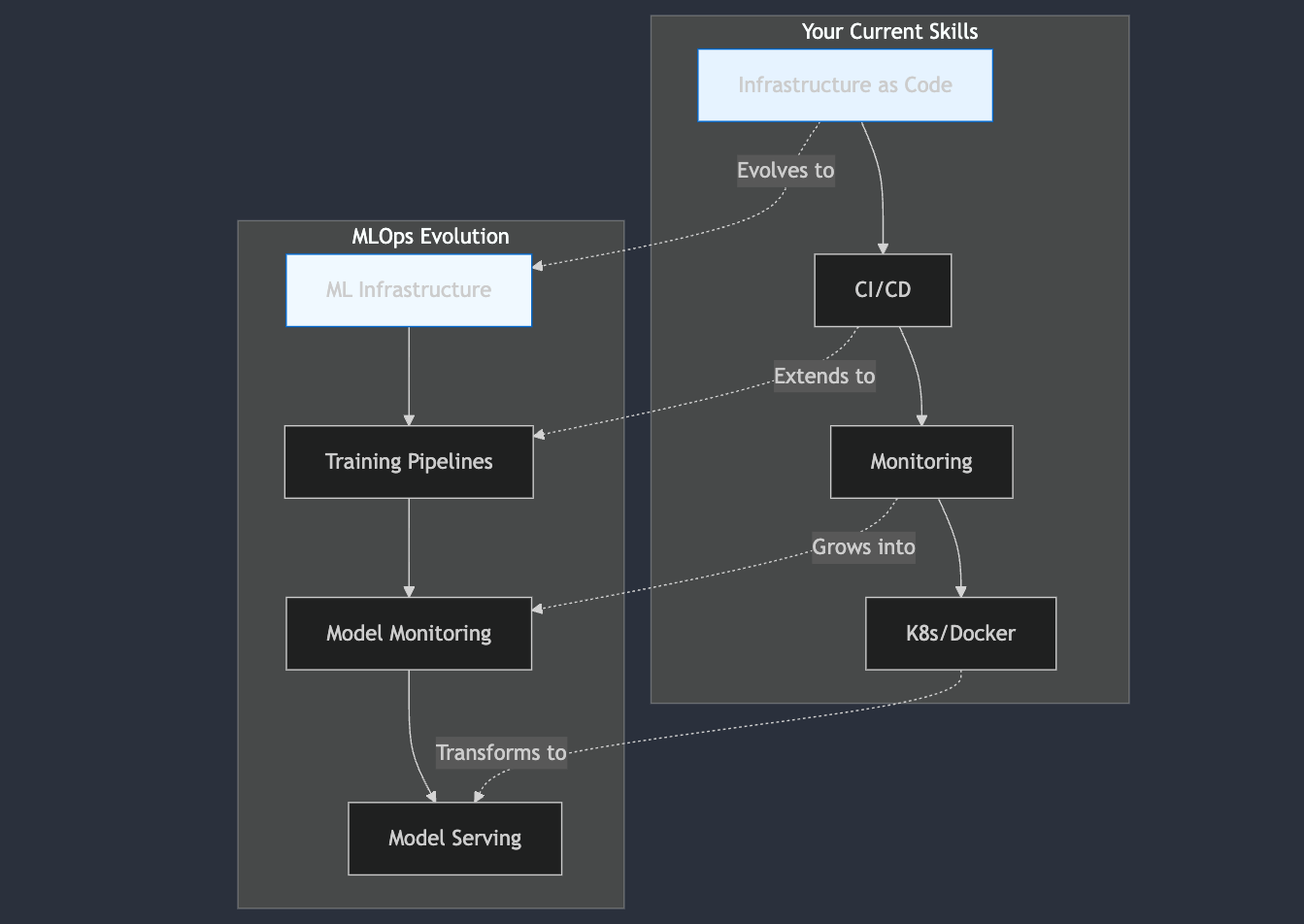From DevOps to MLOps: A Complete Roadmap for DevOps Engineers
Part 0: Your Strategic Guide from CI/CD to Machine Learning Operations
"The best MLOps engineers I've worked with didn't start as ML experts - they were DevOps engineers who understood how to operationalize complex systems."
-- David Aronchick, former Kubernetes Lead at Microsoft
Why DevOps Engineers Are Perfectly Positioned for MLOps
As a DevOps engineer, you're already mastering the art of automating and scaling complex systems. This experience makes you uniquely positioned to enter the world of machine learning operations. Let's understand why and map out your journey to becoming an MLOps expert.
💡 Key Insight:
Your experience with automation, scaling, and operational excellence makes you uniquely qualified for the MLOps transition. You already understand 60% of what makes ML systems work in production.
The Evolution of Operations: From Applications to Intelligence
First, let's visualize how your current devops workflow evolves in the ML world:
In traditional DevOps, you manage a relatively straightforward cycle: code changes trigger builds, tests ensure reliability, and deployment gets the application to users. In MLOps, we extend this familiar pattern in fascinating ways:
Data Becomes Your New Code: Just as you version control your application code, in MLOps you'll version control your data. This is crucial because model behavior depends as much on data as it does on code.
Training Is Your New Build Process: Instead of compiling code into binaries, you're training models on data. This process is more complex and resource-intensive than traditional builds.
Validation Goes Beyond Pass/Fail: While traditional tests have clear pass/fail criteria, model validation involves understanding performance metrics, bias, and statistical significance.
The Current State of MLOps
🔍 Industry Snapshot 2024:
- 76% of enterprises prioritize MLOps- 85% of ML projects fail without proper operations- DevOps engineers with MLOps skills command 25% higher salariesThis data tells us something crucial: organizations desperately need DevOps engineers who can bridge the gap between traditional operations and ML systems.
Your MLOps Journey Map: A Detailed Breakdown
Let's examine the path from DevOps to MLOps expertise:
1. Foundation Phase: Building on Your Strengths
Your DevOps expertise provides a robust foundation. Here's how each component sets you up for success:
DevOps Skills (Current Proficiency)
Your existing knowledge of infrastructure automation, CI/CD, and system operations forms the bedrock of your MLOps journey. These skills directly translate to ML systems, just with new tools and considerations. For instance, your experience with pipeline automation will help you grasp ML training pipelines - instead of building artifacts, you'll be training models.
Python for ML (Near-Term Focus)
While you might already use Python for automation, ML operations require additional familiarity with data processing libraries. You'll extend your Python knowledge to work with:
Data manipulation using Pandas and NumPy
Basic ML operations with scikit-learn
API development with FastAPI for model serving
MLOps Fundamentals (Initial Target)
This is where you'll bridge your DevOps knowledge with ML concepts. You'll learn:
ML lifecycle management
Experiment tracking with tools like MLflow
Data version control using DVC
Basic model deployment patterns
2. Core Skills: The Heart of MLOps
ML Pipeline Automation
This builds directly on your CI/CD expertise. You'll learn to:
Automate data preprocessing workflows
Create reproducible training pipelines
Implement model validation gates
Set up automated retraining triggers
Kubernetes for ML Workloads
Your K8s knowledge evolves to handle ML-specific challenges:
Managing GPU resources
Orchestrating distributed training
Implementing efficient model serving
Handling ML-specific scaling patterns
Cloud-Native ML
Extend your cloud expertise to ML-specific services:
AWS SageMaker or Azure ML deployments
Cloud-based feature stores
Distributed training on cloud infrastructure
Cost optimization for ML workloads
3. Advanced Practices: Mastering MLOps
Model Monitoring
This evolves your existing monitoring practices to include:
Model performance tracking
Data drift detection
Prediction quality monitoring
Resource utilization for ML workloads
Advanced Deployment
Building on your deployment expertise, you'll master:
A/B testing for models
Canary deployments for ML
Multi-model serving
Edge deployment strategies
LLM Operations
The cutting edge of MLOps, where you'll learn:
Large language model deployment
Prompt engineering and management
Vector database operations
Efficient inference strategies
Your Skill Evolution Path
Let's visualize how your existing skills transform into MLOps capabilities:
Let's examine how each traditional DevOps skill transforms:
1. Infrastructure as Code → ML Infrastructure
Your IaC skills evolve to handle sophisticated ML environments:
# Traditional IaC
def provision_environment():
setup_compute()
configure_networking()
setup_storage()
# MLOps Evolution
def provision_ml_environment():
setup_gpu_clusters()
configure_distributed_training_network()
setup_feature_store()
initialize_experiment_tracking()
configure_model_registry()2. CI/CD → Training Pipelines
Your pipeline expertise transforms to handle the unique aspects of ML workflows:
Data validation becomes as crucial as code testing
Model training replaces traditional build steps
Validation includes performance metrics
Deployment includes model serving considerations
3. Monitoring → Model Monitoring
Your monitoring skills expand to encompass ML-specific metrics:
Model performance tracking
Data drift detection
Prediction quality monitoring
Training pipeline observability
4. Container Orchestration → Model Serving
Kubernetes expertise evolves to handle ML workloads:
GPU resource management
Distributed training orchestration
Scalable inference services
Multi-model deployment strategies
The Path Forward
Remember that this journey from DevOps to MLOps is a natural evolution rather than a complete career change. Each step builds upon your existing knowledge, adding new dimensions rather than replacing your current expertise. Think of it as adding ML-specific tools to your already robust operational toolbox.
"MLOps is to ML models what DevOps is to software: a practice to reliably deliver value in production."
-- Chip Huyen, ML Systems Design
Getting Started
The best way to begin your MLOps journey is to:
Start with familiar tools and gradually add ML components
Focus on one skill area at a time
Build practical experience through hands-on projects
Learn from the ML engineering community
Ready to take the first step? Follow along with this series as we dive deep into each aspect of MLOps, building on your DevOps expertise to create robust ML systems.
————————
Tags: #MLOps #DevOps #CareerGrowth #TechTransition #ML #Engineering





